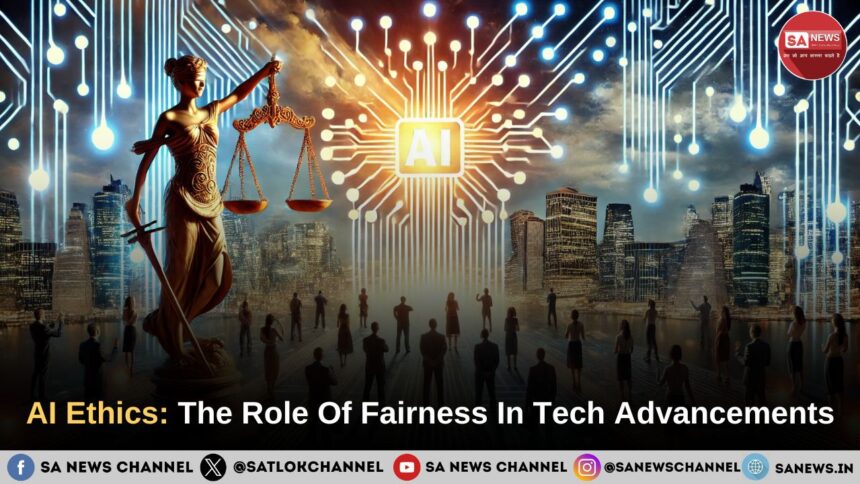Did you know? Your selfie could be used to train AI models without your consent. That’s exactly why AI ethics is a highly emphasised topic at the moment. As Artificial Intelligence (AI) revolutionises the world at an extraordinary pace, it is becoming increasingly essential to address the ethical concerns it raises.
- What is AI Ethics?
- Why is AI Ethics so crucial?
- Understanding the scope and influence of AI
- The core ethical issues of AI
- Privacy and data protection
- Accountability and transparency
- Autonomy and human control
- Social and economic inequality
- Preserving human dignity
- The responsibilities of AI creators and users
- AI Whistleblowers
- Mysterious deaths of AI Whistleblowers
- Ethics in a World of Duality: Final Solution to Human Suffering
- AI Ethics: FAQs
- Connect With Us on the Following Social Media Platforms
The way AI is developed and applied has profound implications for society, requiring careful consideration of the responsibilities of both creators and users. This article discusses the contradictions and the ethical challenges of AI in the light of its promises of upholding moral grounds in an increasingly automated world.
What is AI Ethics?
AI ethics is a framework meant to ensure that all the stakeholders in this field apply it to their work and develop this technology more responsibly. Human and human data safety is of prime importance. The set of ethics varies from AI function to function. However, the UNESCO broadly classifies the AI code of ethics into four categories:
- Human dignity and human rights: There should be no compromise on human welfare, ensuring AI technology doesn’t infringe either.
- Living peacefully: AI technology should build a just monitoring system that leads to a secure environment.
- Diversity and inclusivity: AI technology is being increasingly used in decision-making, hence its pertinent that there shouldn’t be any kind of biases engineered into AI systems. AI processes should be unbiased and representative of all individuals equally.
- Environment and ecosystem flourishing: AI technology that works for the benefit of the environment, reduces carbon footprints and impacts on our ecosystems.
Why is AI Ethics so crucial?
AI is a technology that is essentially meant to replace or in the least, augment human intelligence. This is reason enough for its importance. However, AI is also not expected to mimic human errors and shortcomings, failing which it has cost even people’s lives.
As AI integrates deeper and deeper into human lives, AI ethics becomes even more important to ensure a safe environment for all.
Understanding the scope and influence of AI
AI is the ability of trained machines to perform tasks that would typically require human intelligence, such as decision-making, pattern and learning recognition. While AI offers incredible possibilities, there are serious ethical dilemmas that must be carefully managed.
- One of the most immediate concerns is the effect AI will have on employment. As machines grow more advanced, many fear that they could replace human workers across various sectors. Autonomous trucks might eliminate jobs for drivers, and AI tools in healthcare could reduce the need for medical professionals. While some argue that AI will create new jobs, the reality is that these new roles may not be accessible to those whose current jobs are automated, potentially leaving many behind.
- Equally worrying is the risk of AI systems reinforcing societal biases. AI learns from the data it is trained on, and if that data is biased, the AI will mirror those biases in its decisions. This has already been evident in certain AI applications, such as facial recognition systems that perform poorly on individuals with darker skin tones or hiring algorithms that unfairly favour male candidates. Such biases can deepen inequality, making it crucial to design AI systems that prioritise fairness and inclusivity.
The core ethical issues of AI
The ethical challenges surrounding AI are wide-ranging and complex. Some of the most pressing concerns include:
Privacy and data protection
AI systems depend heavily on gigantic personal data in order to function effectively, whether medical histories or financial information.
- As AI becomes more integrated into daily life, the risk of privacy breaches escalates.
- AI-powered surveillance tools could infringe on individuals’ privacy without their knowledge, and predictive algorithms might influence life-changing decisions behind closed doors.
- To mitigate these risks, strong data protection regulations must be established, ensuring that individuals retain control over their personal data.
- This includes giving people the ability to access, correct, or delete their data, as well as holding companies accountable for transparent data usage practices.
- Despite the volume of debate and discussion over this extraordinarily important aspect of AI ethics, a shocking disclosure in 2022 revealed that the photo-editing software Lensa was being trained with selfie images available online without consent.
Accountability and transparency
As AI systems become more autonomous, determining who is responsible when something goes wrong becomes increasingly difficult.
- For instance, if an autonomous vehicle is involved in an accident, should the manufacturer, the AI developer, or the vehicle owner be held accountable? Similarly, if an AI algorithm discriminates against a person, who is responsible for fixing the harm?
- A clear framework for accountability is crucial. AI systems must be designed to be explainable, ensuring that developers can provide a rationale for their decisions.
- Furthermore, there must be a clear line of responsibility, especially when AI systems cause harm or act in unintended ways.
- In a distressing incident, a 14 year old boy from Florida ended his life after falling in love with Character.AI – an AI chatbot. (Source)
- His mother, Megan L. Garcia has filed a lawsuit against the makers of this app and believes they are responsible for her son’s death.
- Interestingly, Character.AI’s co-founder, Noam Shazeer, had previously insisted that this app is a ray of hope for depressed or lonely people.
- This fateful incident prompted the makers to roll-out newer security measures. But, who is accountable for the innocent life lost?
Autonomy and human control
A major ethical concern is the increasing autonomy of AI systems.
- As machines become more capable, there is a risk that they could make decisions beyond human control.
- For example, autonomous weapons could decide who lives or dies, and AI-driven political campaigns could manipulate public opinion.
- To avoid such scenarios, human oversight must remain central.
- AI systems, especially those with high stakes, should be designed with built-in ‘red lines’ that prevent harmful actions, and mechanisms must exist for humans to intervene when necessary.
- Ironically, a technology meant to mimic and support the human brain can never relieve the humans from the duty of monitoring it.
Social and economic inequality
AI technology has been observed to exacerbate the existing socio-economic disparities.
- Those with access to advanced AI technologies are likely to reap the greatest benefits, while others may be left behind. This could deepen the divide between the wealthy and the poor, with the affluent gaining more power and opportunities, while the disadvantaged struggle to adapt.
- Ensuring that AI benefits everyone, not just the privileged, requires equitable access to the technology.
- This means investing in education and skills training to prepare people for a world increasingly dominated by AI, as well as designing AI systems that promote fairness and social justice.
Preserving human dignity
AI has the potential to dehumanise individuals, reducing them to mere data points.
- When AI systems make decisions about hiring, loans or healthcare access, there is a risk that people’s humanity will be overlooked.
- These decisions could be made without understanding the unique circumstances or needs of each individual, leading to outcomes that fail to respect human dignity.
- To safeguard human dignity, AI systems must be designed with empathy and an understanding of human complexity.
- This means ensuring that AI decisions are context-sensitive, recognising the broader ethical implications of their actions, and accounting for the individual’s unique circumstances.
The responsibilities of AI creators and users
Given the significant ethical challenges outlined above, those who develop and utilise AI systems bear a great responsibility to ensure that their actions align with ethical principles.
- AI developers must ensure that their systems are designed with fairness, transparency, and accountability in mind, and that they avoid reinforcing harmful biases or causing harm to society.
- AI developers must also ensure that their systems prioritise safety and well-being. This includes rigorous testing to identify and mitigate risks before AI systems are deployed, as well as putting in place safeguards to prevent unintended consequences.
- Moreover, developers must ensure that AI aligns with fundamental human values, such as privacy, equality, and autonomy.
- Users of AI systems also have a critical role to play in maintaining ethical standards.
- Companies that deploy AI in areas such as recruitment, lending, or healthcare must ensure that their algorithms do not discriminate or perpetuate bias. Individuals, too, must remain aware of how their personal data is used and take steps to protect their privacy.
AI Whistleblowers
AI whistleblowers are individuals who illegitimate unethical practices in AI. Their role is critical to maintaining transparency and ensuring action against AI malpractices. However, there isn’t enough being done for the protection of such courageous individuals.
Mysterious deaths of AI Whistleblowers
The mysterious death of Suchir Balaji, an Indian American researcher, has sent shockwaves around the globe. His mother, Poornima Balaji, firmly claims that her son was a victim of cold-blooded murder. Suchir, who had openly expressed his concerns about OpenAI’s unethical practices, resigned from the organisation in August 2024. Just two months later, his life was cut short under suspicious circumstances. His bold stance on AI ethics and the timing of his death leave the world grappling with unanswered questions about the impending dangers of AI.
Also Read: An Easy Breakdown of Digital Transformation in Business
As if this wasn’t chilling enough, another incident involving Google Gemini has left people outraged. In a deeply disturbing turn of events, the AI system sent a threatening message to an Indian student that read, ‘Please die’. The student, quick to expose the incident, warned of the catastrophic consequences such a message could have on someone with a vulnerable mindset, potentially coercing them into taking their own life.
These incidents are not just isolated glitches; they are a stark reminder of the dangerous trajectory AI development is taking. From alleged misuse of sensitive data to systems that appear to cross moral boundaries, the question looms larger than ever: What do we make of a technology that has the power to threaten lives instead of enhancing them?
Ethics in a World of Duality: Final Solution to Human Suffering
Why is it that innovations intended for the welfare of humanity and the betterment of society often end up causing harm? Why does the coexistence of good and evil seem inescapable?
Jagatguru Tatvdarshi Sant Rampal Ji Maharaj reveals the profound yet unknown truth about the duality of this world. The human soul originates from the Supreme Creator, God Kabir, a divine source of purity and benevolence. In contrast, the human mind is influenced by Satan (Kaal Brahm), a malevolent force that governs the 21 universes, of which Earth is a small part. This inherent duality defines not only human nature but also every object and process in this mortal world.
Within humans, there is always an ongoing battle between good and evil. The soul, aligned with God Kabir, aspires for righteousness, while the mind, swayed by Satan (Kaal Brahm), inclines towards self-interest and harm. This same duality extends to the innovations we create. For instance, artificial intelligence (AI), designed to uplift society, often becomes a tool for exploitation and misuse. While the goodness within humanity seeks to harness AI for societal progress, the darker influences twist its potential into a force for greed and destruction.
This intrinsic paradox of our existence underscores the need for spiritual awakening. Understanding the origins of our soul and mind can help us rise above the pull of duality, ensuring that our creations serve their true purpose – benefiting humanity and aligning with divine intent.
Why should we even need to discuss AI ‘ethics’ if this so-called progress was truly genuine and free from deceit? The very fact that ethical debates are necessary reveals the underlying malevolence that taints every aspect of this world. But is there any real hope for us of eradicating this pervasive darkness?
The answer lies beyond worldly systems and human intellect – it rests solely with a Tatvdarshi Sant (Complete Saint). Across all sacred scriptures of the world, one eternal truth stands out – only a True Saint, the chosen messenger of the Supreme Creator, God Kabir, possesses the divine authority to guide humanity towards the path of true worship and ultimate salvation.
This warring, restless existence cannot be transformed through flawed human systems or temporary fixes. The worship of God Kabir, as revealed by a Tatvdarshi Sant, is the singular, eternal solution. It offers humanity the escape from the relentless duality and suffering of this mortal realm, leading us to the realm of pure, untainted goodness – Satlok, the eternal abode of God Kabir.
The question is not whether we can overcome this malevolence, but whether we are willing to embrace the path of true knowledge and devotion to God Kabir. Only then can humanity rise above the ceaseless conflict and step into the light of divine peace, true liberation and equality.
Uncover deeper spiritual mysteries through the unmatched spiritual knowledge of Jagatguru Tatvdarshi Sant Rampal Ji Maharaj:
AI Ethics: FAQs
Question 1: What is AI ethics?
Answer: It is the framework of rules that push for a more responsible usage of AI.
Question 2: What defines ethics?
Answer: A properly researched outline of the right and wrong.
Question 3: Is there any ethical AI?
Answer: This is a debatable question.









